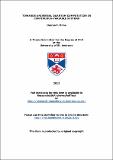Files in this item
Towards universal quantum computation in continuous-variable systems
Item metadata
| dc.contributor.advisor | Korolkova, Natalia | |
| dc.contributor.author | Milne, Darran F. | |
| dc.coverage.spatial | ix, 154 | en_US |
| dc.date.accessioned | 2012-10-22T15:28:09Z | |
| dc.date.available | 2012-10-22T15:28:09Z | |
| dc.date.issued | 2012-11-30 | |
| dc.identifier.uri | https://hdl.handle.net/10023/3210 | |
| dc.description.abstract | In this thesis we explore the possibility of creating continuousvariable quantum systems that are capable of supporting universal quantum computation. We begin by examining the measurement-based model, which employs sequences of measurements on highly entangled resource states, known as a cluster states. We suggest a method for the construction of Gaussian cluster states based on ensembles of atoms and quantum non-demolition interactions. We then go on to expand our model to allow for the inclusion of light modes as part of the cluster. This yields a new class of states, the composite cluster states. This leads us to propose a new architecture for the measurement-based model that uses these composite clusters to increase resource e ciency and reduce computational errors. The second part of this thesis concerns topological quantum computation. In states exhibiting topological degrees of freedom, quantum information can be stored as a non-local property of the physical system and manipulated by braiding quasiparticles known as anyons. Here we show how these ideas can be extended to continuous variables. We establish a continuous variable analogue of the Kitaev toric code, show that excitations correspond to continuous versions of Abelian anyons and investigate their behaviour under the condition of nite squeezing of the resource state. Finally, we expand our continuous variable topological model to include non-abelian excitations by constructing superpositions of CV toric code anyons. We derive the fusion and braiding behaviour of these non-abelian excitations and nd that they correspond to a CV analog of Ising anyons. Using these resources, we go on to suggest a computational scheme that encodes qubits within the fusion spaces of the CV Ising anyons and derive one- and two-qubit quantum gates operations that are implemented in a topological manner. | en_US |
| dc.language.iso | en | en_US |
| dc.publisher | University of St Andrews | |
| dc.subject.lcc | QA76.889M5 | |
| dc.subject.lcsh | Quantum computers | en_US |
| dc.subject.lcsh | Quantum theory--Mathematical models | en_US |
| dc.title | Towards universal quantum computation in continuous-variable systems | en_US |
| dc.type | Thesis | en_US |
| dc.type.qualificationlevel | Doctoral | en_US |
| dc.type.qualificationname | PhD Doctor of Philosophy | en_US |
| dc.publisher.institution | The University of St Andrews | en_US |
This item appears in the following Collection(s)
Items in the St Andrews Research Repository are protected by copyright, with all rights reserved, unless otherwise indicated.

